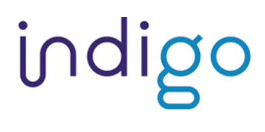
BELGIUM – Ghent, September 29, 2022 – Indigo Diabetes N.V. (‘Indigo’ or the ‘Company’), a pioneering developer of medical solutions using nanophotonics, today announces the enrollment of the first participant in Belgium in the SHINE clinical trial, which is designed to evaluate the longer-term stability of Indigo’s continuous multi-metabolite (‘CMM’) device.
Indigo’s subcutaneously inserted CMM device is in development for the continuous measurement of glucose, ketone and lactate levels in people living with diabetes.
This first participant enrollment, an important Company milestone, has taken place at Antwerp University Hospital (UZA) and represents the first of 15 participants to be recruited in the trial across Belgium, France and Slovenia.
Indigo has recently submitted a paper on the data from its successfully concluded GLOW trial, the first-in-human clinical study of Indigo’s CMM sensor, to a peer-reviewed journal for publication.
Professor Christophe De Block, Principal Investigator of the SHINE trial at Antwerp University Hospital commented: “Continuous monitoring of glucose levels is key in managing diabetes to prevent devastating acute and long-term complications. The possibility of monitoring other biomarkers such as ketones and lactate will take continuous monitoring to the next level. It is a privilege to lead the SHINE clinical trial to evaluate the safety and performance of this ground-breaking novel technology.”
Dr. Danaë Delbeke, CEO, Inventor, and Co-founder of Indigo Diabetes, added: “The start of the SHINE trial is an important milestone for Indigo and follows the successful conclusion of the GLOW trial earlier this year, the results of which we’ve submitted to a peer-reviewed journal for publication. Many multi-metabolite monitoring devices under development sit on the skin and are highly visible, which some people do not like because they can feel self-conscious, stigmatized and uncomfortable. Indigo’s continuous multi-metabolite monitor is subcutaneously inserted and is designed to be inconspicuous. We look forward to seeing how it performs in this longer-term stability trial.”
– Ends –
About Indigo Diabetes N.V.
Indigo Diabetes N.V. (Indigo) is a pioneering developer of medical solutions utilizing nanophotonics. Indigo was founded by Danaë Delbeke and her team in 2016. Today Indigo is developing the world’s first invisible sensor for people living with diabetes to address their need for continuous accurate glucose and ketone monitoring with an improved user experience. Indigo exploits groundbreaking photonics technology responsible for revolutionizing the Internet to transform diabetes management. Indigo is based in Ghent, Belgium. Find out more at www.indigomed.com.
About Indigo Diabetes’s CMM sensor
Indigo Diabetes’s CMM sensor is a small spectrometer-on a-chip to monitor in-vivo simultaneously and continuously multiple metabolites. The inert, miniature integrated silicon photonics spectrometer chip measures the absorption of light in the interstitial fluid to quantify the concentration of multiple metabolites simultaneously without the use of enzymes or fluorophores. Once inserted under the skin the CMM sensor is invisible to the naked eye and will connect securely and wirelessly to mobile devices to show and capture the concentration profiles of the metabolites for the user. A rechargeable sensor battery powers the measurements. It is expected that the sensor will have a lifetime up to 2 years. Preclinical studies have successfully demonstrated proof of concept with promising accuracy.
Further details on the SHINE Study
SHINE is an open label, interventional, multicentre, prospective feasibility study, designed to evaluate the safety of the implantation and preliminary performance of the SHINE SYSTEM. The device will be inserted for 6 months, with the overall study expected to last 12 months from the first participant, first visit (FPFV) to the last participant, last visit (LPLV.)
Up to 15 study participants with diabetes mellitus will be recruited across the following sites: University Medical Centre Ljubljana in Slovenia, Antwerp University Hospital in Belgium, and Lapeyronie Montpellier University Hospital in France.
All subjects will participate in 8 measurement visits over the 6 months of the study duration. During these visits data will be collected on the spectra of glucose, ketones and lactate and compared with the values of metabolites analysed directly from subject’s blood. Glucose levels will also be monitored by CGM device Dexcom G6.
Further details on the GLOW Study
GLOW, listed on www.clinicaltrials.gov under the identifier NCT04782934, was designed to evaluate the safety of the sensor and the short-term integration into the tissue and was a prospective, single-center early feasibility study conducted at Antwerp University Hospital, Belgium. Data was also collected from the seven study participants (three healthy subjects, and four subjects with type 1 diabetes) and used to develop the device to allow real-time, continuous measurement of key metabolite levels in adults with diabetes.
Participants receiving the CMM sensor had the sensor inserted up to 10 mm deep in the subcutaneous abdominal tissue using local anaesthetic. The sensor remained in situ for 30 days after which it was removed. Each participant had 6 measurement visits over the 30-day trial period, during which data for glucose, lactate and ketone levels was collected and compared to applicable standards under controlled circumstances (hypo/hyperglycaemia, anaerobic exercise, ketogenic conditions and during administration of potential interferents such as NSAIDS, vitamin C).
Contacts
Indigo Diabetes N.V.
Dr Danaë Delbeke, CEO
Email: info@indigomed.com
Communications
Consilium Strategic Communications
Ashley Tapp, Alexandra Harrison
Tel: +44 (0)20 3709 5700
